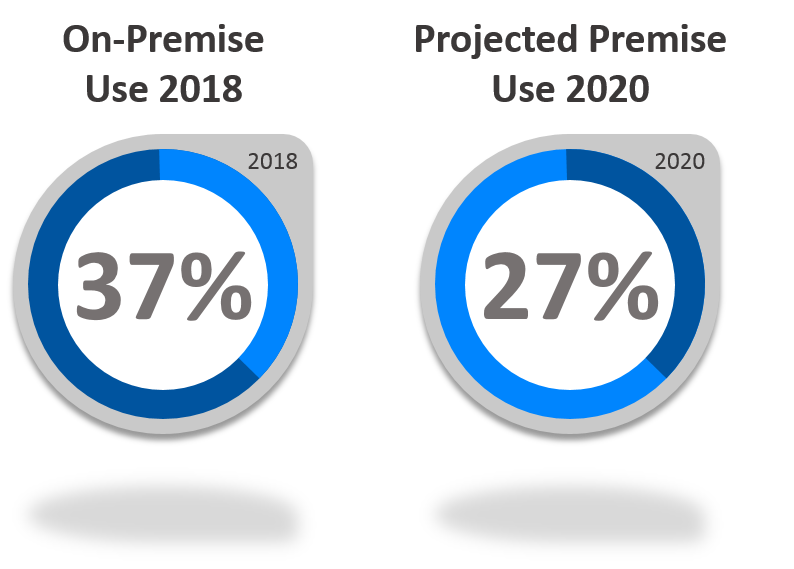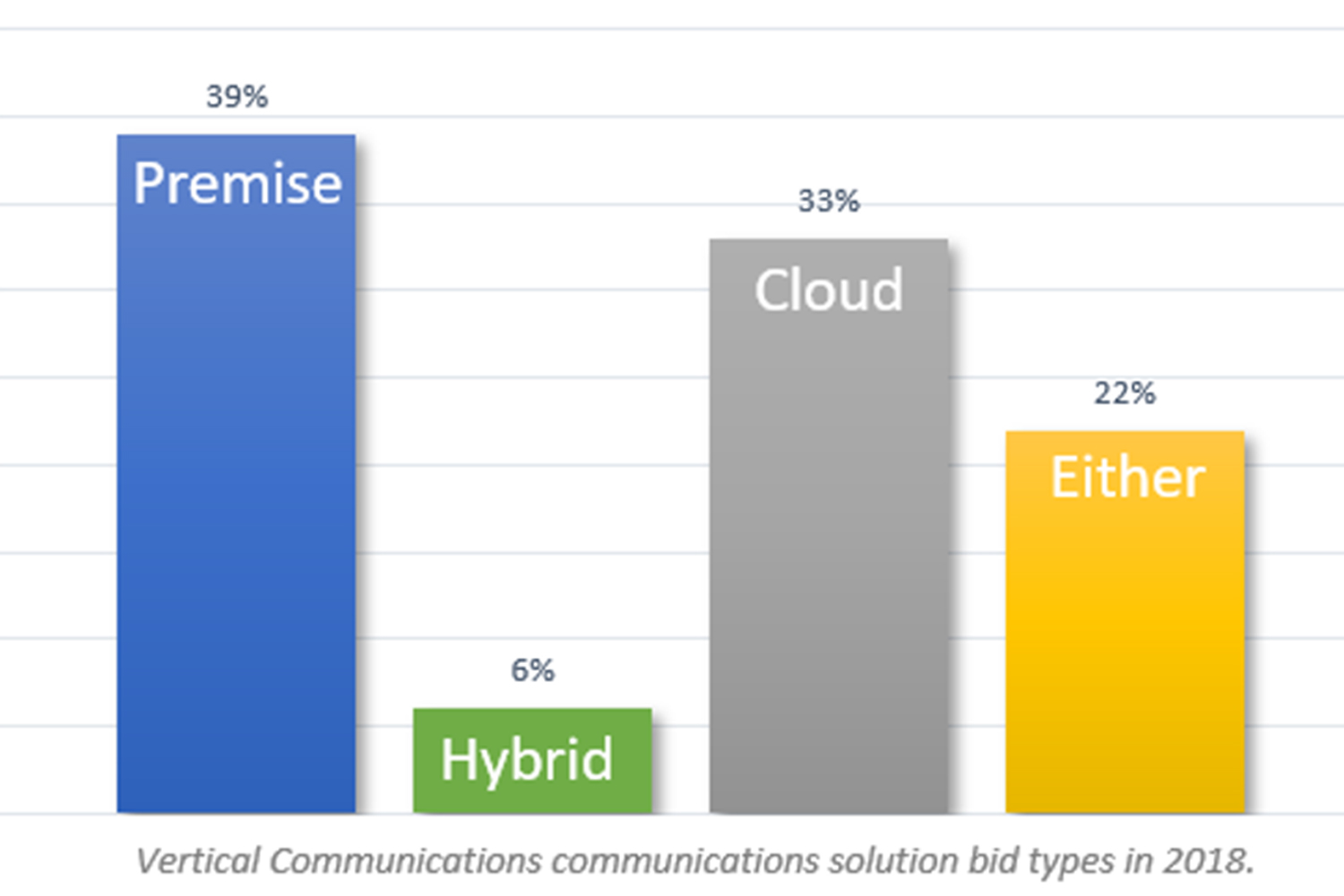Private, Public, or Hybrid Cloud: Which Solution Is the Best Fit for Your Business?

Assessing which cloud solution is right for your unique needs.
In recent years, there’s been a notable shift in telecom solutions, moving from premise deployments, to cloud or hybrid deployments. In fact, by 2020 80% of businesses will move to the cloud. While cloud isn’t right for every organization, this shift is mostly due to the quick-to-update technology, scalability, and operational budget that cloud delivers. It’s also projected that by 2020, the use of premise solutions will have gone down 10% from 2018.

What many users don’t realize, even with all the talk of cloud, is that when moving to a cloud deployment, there are actually three different types of cloud: private, public, and hybrid.
Private, public, and hybrid cloud deliver nuances to you, the end user, in terms of control, flexibility, scalability, cost, and security. When deciding which form of cloud your organization should purchase, there isn’t one answer. Instead, it’s important to fully understand the different aspects of each solution, so that you can select the best option for your strategy.
Option #1 Private Cloud

Private cloud, sometimes referred to as an internal or enterprise cloud, is hosted behind your company’s firewall, on your personal hosted data center. Private cloud can be particularly beneficial to organizations that have already invested in their own data servers, or require specific security measures for their data.
The pro of private cloud is that because it’s behind your firewall, your company has total control of who can access your data, mitigating your risk of a data breach. And, because you have your own private cloud, you have the flexibility to transform the infrastructure based on ever-changing business and IT needs of your organization. You will also have high scalability and efficiency to meet unpredictable demands without compromising on security and performance. Private cloud is also a CAPEX model, which may reduce TCO and allows your organization to make a depreciation write-off.
The con of private cloud is that your company will need to make an initial investment to get your cloud up and running. And, because the private cloud is behind your firewall, your company is responsible for maintenance and for ensuring that your network can withstand a data breach, which decreases redundancy.
In short, private cloud is a good fit for you if you require:
- A high-level of security, where your resources won’t be shared with others and you have a high level of control.
- High scalability, so that you can quickly adapt to quickly evolving business needs.
- Additional flexibility, so that you can customize your cloud environment to specific business needs.
Option #2 Public Cloud

Public cloud is hosted on a by a third-party service provider and is delivered over the internet. Because your data is hosted by someone else, they manage and maintain the data center, relieving your organization of the responsibility.
While your data is stored elsewhere, it doesn’t mean that it is under any additional risk. Your storage space is your own and under layers of security. To understand, compare this to using a bank’s safe deposit system. While there are hundreds of safe deposit boxes in the safe deposit room, your box is separate. It is completely your own, and under lock and key that is unique and available only to you. The security of public cloud is based on the security measures your hosting company takes, and you have room for a substantial amount of data. You can even increase the space you have, allowing for high scalability and flexibility.
The pro of public cloud is that because it is hosted off site, no investments are required to deploy and maintain your IT infrastructure. The high scalability and flexibility can help meet unpredictable workload demands. Public cloud includes off-premise hosting and management, and, like all cloud environments, the cost savings are significant. Public cloud is an OPEX model, which enables predictable monthly cost for organizations.
The con of public cloud is that it isn’t the most viable solution for organizations that must adhere to high levels of security compliance or require availability in sensitive mission-critical IT workloads. Low visibility and control into the infrastructure may not suffice to meet certain regulatory compliance, and there are limitations in regards to customization and integration with business processes.
In short, public cloud is a good fit for you if you require:
- Lower costs, so that you won’t have to purchase hardware or software. You will only pay for the service you use.
- No maintenance, so that you can focus on your business objectives.
- Nearly unlimited scalability, so that your features can be updated remotely to meet your business needs.
- High reliability, so that you don’t have to worry about failure.
Option #3 Hybrid Cloud

Hybrid cloud combines the use of private and public cloud to increase redundancy. Hybrid cloud is ideal for companies that have multiple locations, with business-critical communications, that have one or more locations that experience poor network connectivity.
When an organization selects hybrid cloud, they start by choosing between private and public cloud, based on their unique needs. Then, to create the hybrid solution, a local gateway is hosted on site. During normal connectivity, the gateway uses the cloud to complete communications functions. In the event of poor network connectivity, the gateway takes over to complete the communications functions, creating increased redundancy. This ensures that your communications stay up and running no matter what is happening with the internet in your area.
The pro of hybrid cloud is increased redundancy in the event of a poor connection due to the network or extreme local weather.
The con of hybrid cloud is whatever cons are associated with the public or private cloud that you select.
In short, hybrid cloud is a good fit for you if you require:
- Redundancy, due to low network connectivity or frequent extreme weather in your area.
Which Cloud Solution is Right for You?
So which cloud solution is right for you? When it comes to selecting a cloud deployment, there is no “correct” answer. The best solution is the solution that best supports your business requirements and needs.
For some organizations, the best solution isn’t always clear. With varying needs, business requirements, and compliance regulations, selecting a cloud solution can be confusing. But it doesn’t have to be. Vertical has a team of experienced solution engineers to help you determine what the ideal solution is for your company. Vertical also offers cloud solutions from the best providers out there. We’re here to help you navigate cloud.



